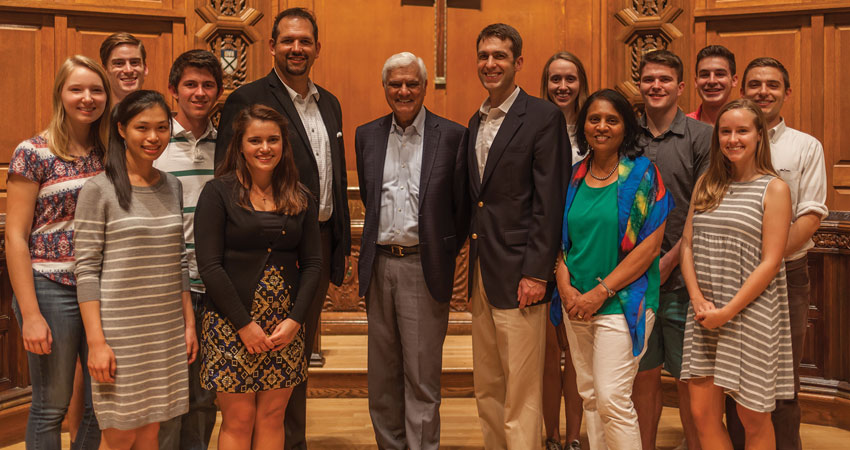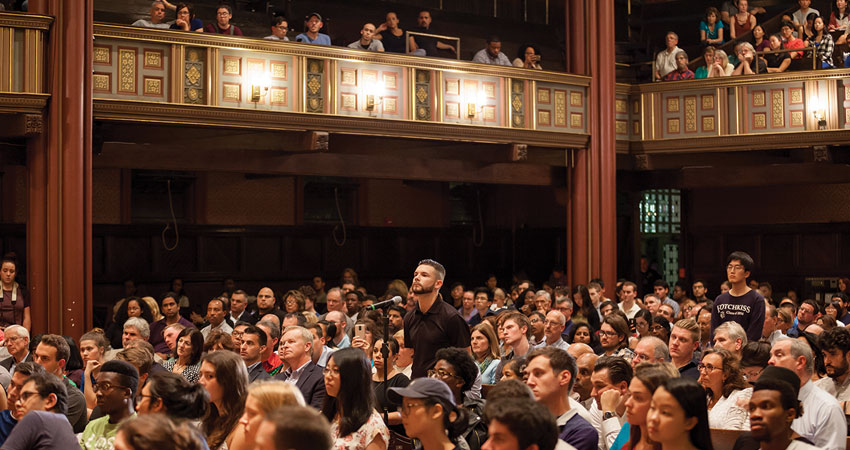Christian Union Hosts Forum with Ravi Zacharias, Abdu Murray at Yale
by Kayla Bartsch, Yale ’20
Why does the truth matter?
This was the question posed by renowned apologists, authors, and scholars Abdu Murray and Ravi Zacharias to skeptics and believers alike at Yale University on the evening of October 10th. In the woody, warm sanctuary of Battell Chapel, a full house of 650 Yale students, local community members, and travelers from across the region congregated to hear Murray and Zacharias discuss “The Quest for Meaning in a Post-Truth Culture.” The Yale University Open Forum was made possible through the sponsorship of Ravi Zacharias International Ministries and Christian Union at Yale.

The bustling pews grew silent as Clay Cromer, ministry director of Christian Union at Yale, gave a warm welcome to the visiting speakers. Ravi Zacharias, the host of the Let My People Think radio program, has spoken at universities and institutions around the world over the last 45 years, including Cambridge, Oxford, the United Nations’ Annual Prayer Breakfast, the Pentagon, and the White House.
Abdu Murray is the North American director of Ravi Zacharias International Ministries and the current Scholar-in-Residence of Christian Thought and Apologetics at the Josh McDowell Institute of Oklahoma Wesleyan University. For most of his life, Murray was a devout Muslim. However, after a decade-long period of investigation into the major world religions, he was convinced by historical, philosophical, and scientific evidence that only Christianity could fulfill the human soul.
Murray took the podium first. The theme of his talk centered on the inseparable relationship of truth and freedom, and the genuine nature of both. He argued that the world is in a desperate state of vertigo, lacking any fixed points or anchors to guide our decisions or the decisions of our institutions. Due to this unstable, relativist state, the time to think about what ought to guide us in our quest for meaning is now, he said. Our post-truth culture elevates feelings and preferences over truth, creating a swirling, clashing storm of values which blinds one to those which matter the most.

Murray, who holds a bachelor’s degree in psychology and a law degree from the University of Michigan, made an important and insightful distinction concerning the lack of objective truth in our society today. The post-truth culture we are living in has an attitude that has surpassed the previous, postmodern view, which simply denied the existence of an objective truth, but still believed in the power of logical reasoning to sharpen one’s understanding of reality. The post-truth position, however, acknowledges that truth exists, but simply shrugs its shoulders – elevating feelings and preferences over the truth. Murray described the post-truth person as one who “sacrifices his reason on the altar of his preferences.” With a complete disregard for the truth, discussions become a groundless yelling match, a Nietzschean battle of the power of the will with no higher reality to call upon other than one’s own emotions and desires.
The absence of this regard for truth and reason has often been hailed as a liberation, as freedom from strictures of the past. In response to this sentiment, Murray pointed out that we have confused freedom with autonomy. When autonomous, you are not free, but subject to your own whims and ultimately to chaos. Your opinions become the truth, for you are your own god, king, and judge, and you become trapped inside your own desires and biases, Murray said. Real freedom is not simply the absence of restrictions, but the ability to live the life you were meant to live, as informed by the truth, and embodied by Christ. And as such, Murray concluded, truth and freedom are fundamentally connected.
Murray described the post-truth person as one who “sacrifices his reason on the altar of his preferences.” With a complete disregard for the truth, discussions become a groundless yelling match, a Nietzschean battle of the power of the will with no higher reality to call upon other than one’s own emotions and desires.
Zacharias, the author of 25 books, started his segment by identifying a pattern common to humanity. In each age, he said, we tend to think we have reached the zenith of human potential. Whether an overconfident professional athlete, or a writer of the Romantic era, the human ego knows no bounds. The only way to check ourselves is to seek out a broader truth, one which surpasses time and place. When we lose access to this stream, there is nothing to keep us grounded, to keep our reality stable.
A former army chaplain in the Vietnam War, Zacharias asserted that he has “never seen the world in such uncertainty,” and also noted a deepening sense of “fear and hopelessness.” Without access to a firm understanding of truth, the political realm seems more and more like an unpredictable back and forth. As such, Zacharias quoted Winston Churchill and Martin Luther King, Jr. in affirming that “truth is the most valuable thing in the world,” and “truth...will have the final say.”
Zacharias’ thesis was that the truth matters. He shared the story of a friend who had been falsely imprisoned – in such heightened circumstances the importance of truth becomes clear. Zacharias also shared the story of a Hollywood director who had been leading a worldly, opulent lifestyle, and yet was pained by a continual feeling of emptiness. He used this testimony to show that, despite being surrounded by beauty and comfort, there is no real joy, no real human fulfillment, in leading a life outside of truth.
Zacharias concluded his talk by demonstrating how we live out the truth, which we can only do through Christ. He argued that we must look to eternity in our planning, that we must look up to God for our morality, that we must hold ourselves and each other accountable, and that we must love our fellow humans, despite our differing opinions.
After their talks, Zacharias and Murray opened the floor to questions, giving priority to Yale students and skeptics. The questions varied, and Murray and Zacharias responded with great alacrity and insight.
A bold question from a skeptic in the audience challenged the accuracy of Scripture and the resurrection as historical fact. Murray gave a thorough, coherent reply, even discussing secular scholarship that supports the New Testament as one of the most accurate collections of primary documents we have access to. Murray’s great knowledge of manuscript dates and authentication processes and his own experience coming from skepticism to believing in Scripture’s historical accuracy stood out as a major takeaway from the night for Robert Denniston ’20.
“In Abdu Murray’s journey through skepticism, he did a very good job bringing the historical reality of the salvation story into his talk,” Denniston said. “It was very grounding to listen to the historical basis for the resurrection, and to the reminder that the Gospels really happened.”
The Open Forum at Yale certainly caused reflection among those who were in attendance, including Lionel Jin ’18, a major in Molecular, Cellular, and Developmental Biology.
“Not being a Christian myself, I’m nevertheless fascinated about the role that faith plays in the lives of others,” Jin said. “It was a privilege to see Ravi’s oratory in action. He clearly tapped into a deep sense of unease that many people have about society today, and while I’m not sure that there are easy answers, I appreciated him prompting us to dig deeper into how we are living our lives.”
For more quotes from the evening, visit Christian Union’s Twitter page.





